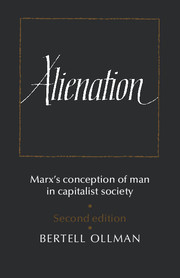Book contents
- Frontmatter
- Contents
- Preface to the second edition
- Note on translations
- Acknowledgements
- General introduction
- PART I PHILOSOPHICAL INTRODUCTION
- PART II MARX'S CONCEPTION OF HUMAN NATURE
- PART III THE THEORY OF ALIENATION
- PART IV CONCLUSION
- Appendix I In defense of the philosophy of internal relations
- Appendix II Response to my critics: more on internal relations
- Notes to the text
- Bibliography of works cited
- Index of names and ideas
- Cambridge Studies in the History and Theory of Politics
Appendix I - In defense of the philosophy of internal relations
Published online by Cambridge University Press: 05 June 2012
- Frontmatter
- Contents
- Preface to the second edition
- Note on translations
- Acknowledgements
- General introduction
- PART I PHILOSOPHICAL INTRODUCTION
- PART II MARX'S CONCEPTION OF HUMAN NATURE
- PART III THE THEORY OF ALIENATION
- PART IV CONCLUSION
- Appendix I In defense of the philosophy of internal relations
- Appendix II Response to my critics: more on internal relations
- Notes to the text
- Bibliography of works cited
- Index of names and ideas
- Cambridge Studies in the History and Theory of Politics
Summary
In this appendix, I would like briefly to examine some of the major criticisms that have been leveled against the philosophy of internal relations. Perhaps the most frequent objection made, certainly the most telling, concerns the difficulty (some would claim the impossibility) of identifying particulars on this view. How, in other words, do we distinguish – which includes pointing out to others and getting them to accept – that these relations, no more and no other, constitute a chair, a man, or any other particular thing? This is really a version of the problem of individuation mentioned in the text.
Stuart Hampshire, who makes this criticism, admits that there are many possible ways to break up reality, but says that the requirements of communicability necessitate that, we always conceive of it as broken up into more or less distinct pieces. According to him, ‘we must unavoidably think of reality as consisting of persisting things of different types and kinds’, since there must be a ‘type of term which enters into utterances having the function “This is a so-and-so”’. For him, there must be a possibility of making an absolute distinction between a thing and its properties. What is taken as the thing serves as a point of reference which remains the same throughout all changes occurring in its properties and in the point of view of the perceiver.
- Type
- Chapter
- Information
- AlienationMarx's Conception of Man in a Capitalist Society, pp. 256 - 262Publisher: Cambridge University PressPrint publication year: 1977



